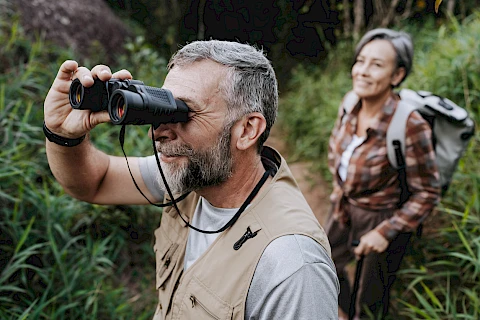
Birdwatching, also known as birding, is a hobby enjoyed by people of all ages worldwide, but it is particularly appealing to seniors. This gentle, nature-centered pastime allows seniors to exercise, stimulate their minds, and enjoy the beauty of their local environment.
Unfortunately, the wealth of bird species and local birdwatching organizations can make it difficult to know where to begin. At Senior Helpers Charlotte, we understand the importance of providing comprehensive resources that allow seniors in any location to engage in this fulfilling hobby. In this blog post, we'll share essential birdwatching resources that are accessible from anywhere but have a special focus on localized information to help you discover the abundance of your local area. This guide will serve as a great starting point in your birdwatching journey.
The Benefits of Birdwatching for Seniors
Birdwatching is a hobby that benefits seniors in numerous ways. It involves gentle, low-impact physical activity, such as walking, which can improve cardiovascular health and general fitness. Just make sure to have a conversation with your doctor before starting any new workout regimen or activity.
The need to identify different bird species stimulates cognitive function, keeping the brain active and engaged. On a more emotional level, watching birds can provide a sense of relaxation and peace, reducing stress levels. The social aspect of birdwatching should not be overlooked either. Joining a local birdwatching group can offer camaraderie and shared enjoyment with fellow nature enthusiasts.
National and International Birdwatching Resources
Birdwatching groups and organizations exist on both national and international scales. These organizations often provide easily localized resources, giving you access to bird species lists, prime birdwatching locations, and even organized events or trips in your area:
These resources curate extensive databases on bird species, habitats, and migration patterns. These resources can help you learn about bird species in your area, allowing you to spot and identify them more easily. These organizations also have local branches nationwide, offering more specific guidance and community engagement.
Using Local Resources for Birdwatching
While national and international resources are handy, local resources often provide more detailed and specific information about birdwatching in your immediate area:
- Your local Audubon Society chapter
- County parks department
- Local nature centers
- Botanical gardens
These places can often provide information about local bird species, the best times of year to see them, and prime birdwatching locations. Don't underestimate the value of local knowledge; local birdwatchers can provide insights and tips you won't find elsewhere!
Getting Started With Birdwatching
Embarking on your birdwatching adventure does not require much. All you need are:
- A good pair of binoculars
- A bird identification guide specific to your area
- A notebook to record your observations.
As a beginner, don't worry about identifying every bird you see. Instead, try focusing on learning a few common species first. Remember, patience is key. Sometimes, you may have to wait or return to a spot several times before you spot a particular bird. But don't be discouraged. The thrill of finally spotting and correctly identifying a bird is worth the wait.
Need Help Getting Started With Birdwatching?
Birdwatching is much more than a hobby. It's a way for seniors to stay active, engage their minds, and connect with nature and fellow enthusiasts. With the global and local resources available, anyone can start their birdwatching journey, regardless of their location.
If you're in the Charlotte, Pineville, or Concord area and need additional support or resources, don't hesitate to contact us. The Senior Helpers Charlotte team is passionate about providing seniors with the resources and support they need to enjoy their golden years.